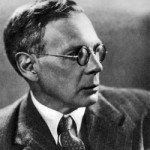There is an important phrase from the author Charles Williams (a friend of JRR Tolkien and CS Lewis) that I have remembered for years, especially when I have not gotten what I wanted, or have struggled to know and fulfill what I really want.
He speaks of “preferring the given.”
What does it mean to prefer what actually happens in our lives, rather than to cling to what we wish would happen?
For the most part, most of us spend most of our time wishing for things to be otherwise than they actually are. Jobs. Relationships. World events. Health concerns. Traffic. Whatever.
You could imagine preferring what happens, what is “given,” as a passive stance, as letting things happen instead of actively engaging and making changes. But that is not what Williams meant.
To prefer in this case is an active choice. It is to adopt an open stance to the world, to what comes into our lives. We don’t have to like things that feel bad–getting fired or dumped or hit with the flu–and preferring the given does not mean turning away from dark emotions. It doesn’t mean pretending that we are not hurt, angry, or grieving.
Imagine instead not having to like the bad stuff at all, not having to make anything nice or better when it really isn’t, but also standing with both feet planted on the ground, and facing what really is. So much of our energy typically goes into the frantic attempt to make things different, even the things that cannot be changed. What if that energy were freed up for other uses?
Sometimes we find that after releasing into life as it actually is, and actively choosing to face what happens both when we like it and when we don’t, then paradoxically the deep changes that we long for begin to come. It is as if our need to be (or to delude ourselves into believing that we are) in control creates a tight knot of feelings and thoughts and patterns that keep us bound up.
Nothing can move significantly if it is bound up. Preferring the given has the potential to create a clearer seeing, a spaciousness, and an open heart, and these shifts can loosen the knot in us that prevents our development from moving forward.
The center out of which we live can then shift from the “I” we thought knew the answers, or had the right plan, to another “I” in us that resides in a deeper place, and out of this deeper place a life and a self can emerge that feels more fulfilling, more authentic, and more trustworthy in the long run.
Charles Williams:
